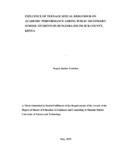Please use this identifier to cite or link to this item:
http://ir-library.mmust.ac.ke:8080/xmlui/handle/123456789/607Full metadata record
| DC Field | Value | Language |
|---|---|---|
| dc.contributor.author | Negesa, Justine Ventrina | - |
| dc.date.accessioned | 2018-07-04T09:13:30Z | - |
| dc.date.available | 2018-07-04T09:13:30Z | - |
| dc.date.issued | 2018-05 | - |
| dc.identifier.uri | http://r-library.mmust.ac.ke/123456789/607 | - |
| dc.description | THESES | en_US |
| dc.description.abstract | Sexual activities among adolescents have been reported to be on the increase. The trend across the world shows that many adolescents are initiating sexual activity from as early as 10 years with many disastrous effects on their lives, health and education. These behaviors predispose teenagers to academic risks by reducing their motivation to learn, as well as their feeling of connectedness to academic performance. The purpose of the study was to investigate the influence of teenage sexual behavior on academic performance among public secondary school students in Bungoma South Sub-County, Kenya. The objectives of the study were to: establish the influence of teenage homosexuality, heterosexuality, contraceptive use and guidance and counseling programs on academic performance of secondary school students. The Social Cognitive Theory and Social Learning theories developed by Albert Bandura guided the study. Descriptive survey and correlational research designs were used. The study population comprised 3,774 form 3 students, 52 Deputy Head teachers and 52 Guidance and Counseling teachers in public secondary schools in Bungoma South Sub-County. Data was collected using questionnaires, interview schedules and Focus Group Discussions. The instruments were validated by supervisors and research experts‘ opinion and were adjusted based on their recommendations. The reliability coefficient of the instruments was set at .70 and .829 was achieved from the piloted set of tools. Both descriptive and inferential methods of data analysis were employed. In descriptive analysis, mean, frequencies and percentages were used while in inferential statistics; Pearson‘s r was employed to test the significance of hypotheses. Findings of the study were analysed using descriptive and inferential statistics. Findings indicate a slight positive correlation between teenage homosexual behaviour and academic performance, which was statistically significant (r = .189, n = 384, p = .01). There was low significant positive relationship between risks associated with teenage homosexual behaviour and academic performance among the learners. Moreover, results show negative relationship between teen heterosexuality and academic performance (r = -.703**, p<.00). The more teenagers are actively involved in heterosexual activities the more their minds are pre-occupied with possible disruption to education. In addition, there exists a significant and positive relationship between teen contraceptive use and academic performance (r =.955**, p<.00). The majority, 35.17% of the respondents disagreed that presence of health programs did influence their academic performance. The study recommends special attention to be given to students with a view to integrate them to conform to societal expectations. Sex education to be introduced in schools before adolescence, so as to ensure teenagers go through the transition from adolescence to adulthood without compromising their education goals. The guidance and counseling departments should be strengthened to enhance their effectiveness and stakeholder participation should be encouraged. | en_US |
| dc.description.sponsorship | SCHOOL OF EDUCATION | en_US |
| dc.publisher | MMUST | en_US |
| dc.subject | Sexual activities | en_US |
| dc.subject | adolescents | en_US |
| dc.subject | Bungoma South Sub-County | en_US |
| dc.title | INFLUENCE OF TEENAGE SEXUAL BEHAVIOUR ON ACADEMIC PERFORMANCE AMONG PUBLIC SECONDARY SCHOOL STUDENTS IN BUNGOMA SOUTH SUB-COUNTY, KENYA | en_US |
| Appears in Collections: | School of Arts and Social Sciences | |
Files in This Item:
| File | Description | Size | Format | |
|---|---|---|---|---|
| INFLUENCE OF TEENAGE SEXUAL BEHAVIOUR ON ACADEMIC PERFORMANCE AMONG PUBLIC SECONDARY SCHOOL STUDENTS IN BUNGOMA SOUTH SUB-COUNTY, KENYA.pdf | Main thesis | 2.3 MB | Adobe PDF |  View/Open |
Items in DSpace are protected by copyright, with all rights reserved, unless otherwise indicated.
